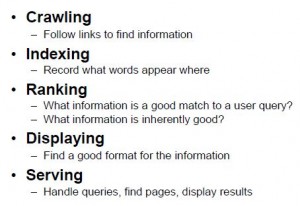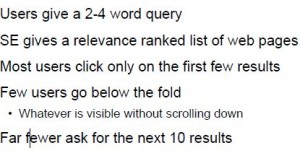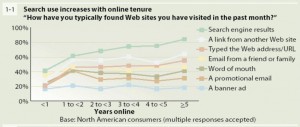Skepticism About SEO
We are a bit skeptical about search engine optimization (SEO) firms. Of course there are legitimate SEO firms, but many are simply keyword stuffers and link purchasers masquerading as value added providers with valid search engine optimization strategies – damaging the perception of an entire industry.
Despite what any firm tell you, SEO will not solve your marketing problems. What most organizations need is not a standalone SEO strategy; they should actually be pursuing a holistic interactive strategy.
Effective interactive strategy is, and should, be about supporting business goals. It must be supported by clear responsibility and accountability, standards and processes. It isn’t myopically focused on tools and technology, including web SEO, and aligns with business strategy.
The Black Art of Search Engine Optimization How To
Search engines started to emerge around 1994 with search giant Google appearing around 1996. Google has become so pervasive, it’s brand name has become a common verb – to Google. According to Forrester, 80% of users are using search engines to find content.
Initial search engines were not very sophisticated and relied heavily on informational retrieval for determining relevancy. However, information retrieval isn’t sufficient because a it doesn’t capture who the true information authority is. What does this mean? Without authority, the same article posted at the American Medical Association and copied on your website are considered the same.
Google showed that adding link analysis resulted in significantly better search results – and like lemmings the rest of the industry followed. And, so did an industry of experts for helping companies climb to the top of search engine lists, since data has shown that most consumers (90%) rarely go beyond page 3 of Google results.

common SEO terminology
Today, you can barely visit a social media site without seeing at least one ad promoting the latest in search engine optimization tools or some trick for picking the perfect search engine optimization keywords. However, keyword web spam has made keyword density, as a standalone concept, a poor determinant of relevant content.
Search engines may place significant weight on domain age, site authority, link anchor text and usage data. Search engines have grown more sophisticated, and each search engine has its own proprietary algorithm that judges relevance, which may:
- Weight page title more than other text
- Give less weight to hidden content like meta-tags and comments. Many major engines give zero weight to the meta-keyword tag.
- Ignore shady behavior like an entire page of H1 content or bolded H1
- Ignore content with an excessive focus on density
Many sites have contradictory rules and promises that content can be optimized for all engines at all times are simply false. Engines are constantly changing data and algorithms resulting in slightly different results. Only the big changes are publicized. Additionally, Yahoo and Google have outsourced labor through firms like LionBridge to provide human feedback on the search results.

SEO User Behavior
Google’s recent algorithm changes impacting content farms and vendors with negative comments demonstrate that bad search result placement can have significant revenue impacts. It understandable why businesses are concerned and want to optimize their search engine placement.
However, site owners would be better served by avoiding tricks and ensuring they have high quality content that people want to read and link to their site.
If site owners can pull a targeted keyword phrase out of their web copy, and it is still easy for search engines to model the removed phrase and what the page is about given the supporting text then that is good SEO and good content – the SEO grail. This strategy will result in more stable rankings AND will likely rank the site for a far wider set of related keywords.

